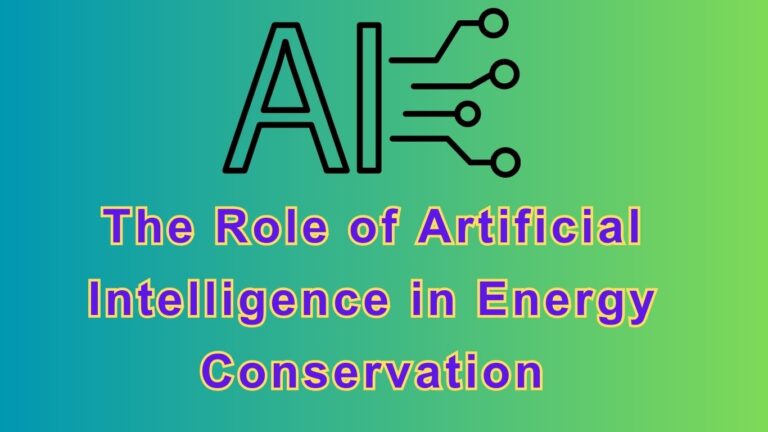
- Introduction
- AI-Driven Energy Systems
- Benefits of AI in Energy Conservation
- Challenges and Considerations
- The Future of AI in Energy Conservation
- Conclusion
Introduction
Energy conservation has become an increasingly critical issue in today’s world, as we strive for more sustainable practices to minimize the impact on the environment while meeting the growing energy demands. In this pursuit, artificial intelligence (AI) has emerged as a powerful tool that holds significant potential for driving energy efficiency and conservation.
AI systems leverage advanced algorithms and machine learning techniques to analyze massive amounts of data, identify patterns, and make informed decisions autonomously. When applied to energy conservation, AI can optimize energy consumption, reduce wastage, and improve overall energy efficiency across various sectors.
AI-Driven Energy Systems
One of the key areas where AI is making a notable impact is in the development of AI-driven energy systems. These systems utilize real-time data from smart grids, sensors, and IoT devices to monitor and control energy usage efficiently. Machine learning algorithms analyze the data to identify consumption patterns, predict demand, and optimize energy distribution.
For instance, AI can enable intelligent load balancing by dynamically allocating resources based on demand patterns. It can automatically adjust energy usage in buildings by coordinating HVAC systems, lighting, and other energy-consuming devices for optimal efficiency. Additionally, AI-powered systems can facilitate demand response mechanisms, where energy consumption is adjusted in response to grid conditions and pricing signals.
Benefits of AI in Energy Conservation
The incorporation of AI in energy conservation brings several benefits for both individuals and businesses. Some of the notable advantages include:
- Improved Energy Efficiency: AI algorithms can analyze complex data sets and identify opportunities for optimizing energy consumption, leading to enhanced efficiency and reduced waste.
- Smart Grid Optimization: AI can enable predictive maintenance, fault detection, and real-time monitoring of the power grid, leading to improved grid stability and reduced power outages.
- Renewable Energy Integration: AI can assist in integrating renewable energy sources into the power grid by forecasting renewable energy generation, optimizing storage systems, and managing energy demand based on availability.
- Energy Cost Reduction: AI-driven systems can identify energy-saving opportunities, enabling cost reduction for individuals and organizations through optimized energy usage.
Challenges and Considerations
While AI offers immense potential in energy conservation, there are several challenges and considerations to address for successful implementation:
- Data Availability and Quality: Access to high-quality data is crucial for accurate AI analysis. Ensuring data availability, integrity, and compatibility across different systems can be a significant challenge.
- Privacy and Security: Energy data collected by AI systems may contain sensitive information. Safeguarding data privacy and ensuring robust cybersecurity measures are of paramount importance.
- Algorithmic Transparency and Bias: When AI systems make decisions that impact energy consumption, it is essential to ensure transparency in algorithms and address potential biases to maintain fairness and equity.
- Infrastructure Readiness: Implementing AI-driven energy systems requires compatible infrastructure, including smart grids, sensors, and IoT devices. Ensuring the readiness and reliability of such infrastructure is critical.
Read More : The Rise of AI Technology to Revolutionizing Industries
The Future of AI in Energy Conservation
The application of AI in energy conservation is an evolving field with promising prospects. As technology advances and data availability improves, we can expect further advancements such as:
- Advanced Predictive Analytics: AI systems will leverage more extensive datasets and enhanced machine learning algorithms to provide increasingly accurate demand forecasts, optimizing energy usage accordingly.
- Real-Time Energy Market Integration: AI can enable dynamic pricing models and real-time energy market integration, empowering consumers to make informed decisions about energy usage based on cost and availability.
- Decentralized Energy Management: AI can facilitate the development of decentralized energy systems, where local energy sources and storage solutions are intelligently managed to enhance self-sufficiency and resilience.
Conclusion
The integration of artificial intelligence in energy conservation holds tremendous potential for driving sustainable practices and optimizing energy consumption. By leveraging AI-driven energy systems, businesses and individuals can achieve improved energy efficiency, reduce costs, and contribute to a greener future.
However, it is crucial to address challenges related to data quality, privacy, algorithmic bias, and infrastructure readiness to ensure successful implementation. As technology continues to advance, the future of AI in energy conservation looks promising, paving the way for a more sustainable and efficient energy landscape.